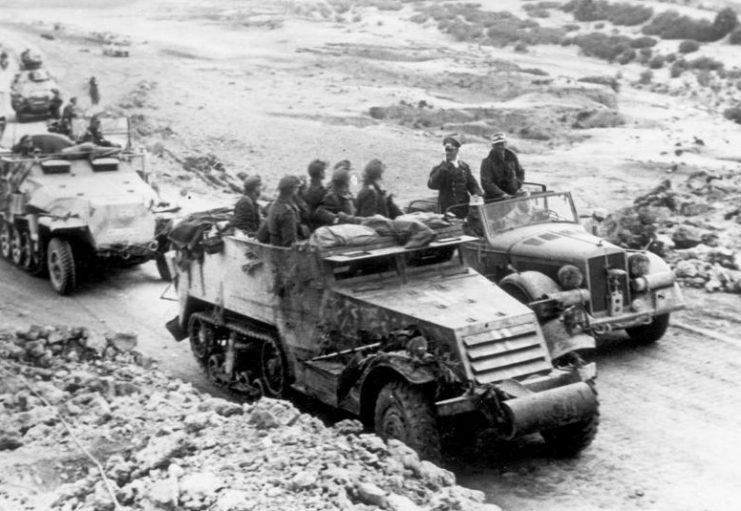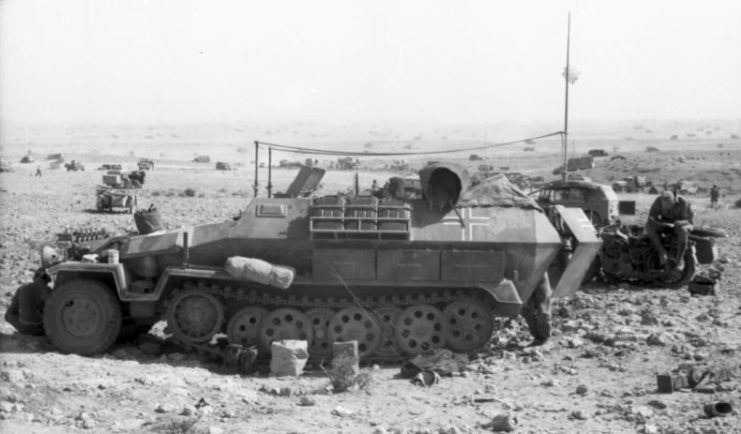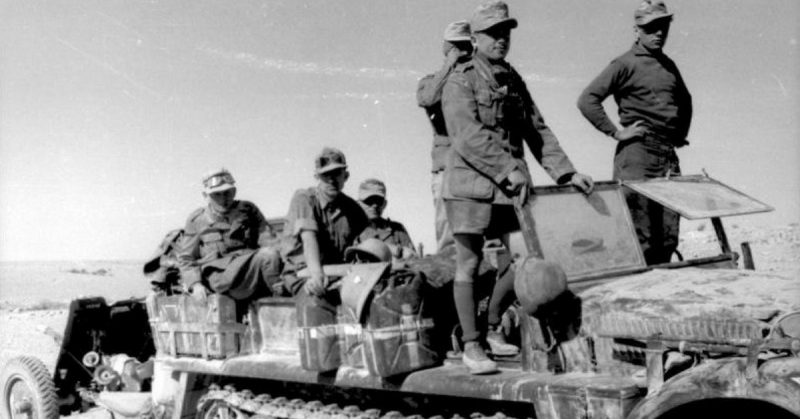War has always been brutal. Sometimes, however, generals try to be civilized. In the midst of battle, they stop, chat with the enemy, and enjoy a calming drink. It all depends on their upbringing, of course.
Such a man was Hans-Ulrich Freiherr von Luck und Witten, known as Hans von Luck. He was born on July 15, 1911 in Flensburg, Prussia into a family with a long and proud military history. His father had served in the Imperial German Navy and died in WWI.
Hans von Luck joined the German army in 1929. He was taught by Field Marshal Erwin Rommel – a decorated WWI veteran, and later, a hero of WWII. On June 30, 1934, von Luck’s unit was among those responsible for the Night of the Long Knives when Hitler purged his own party to consolidate his grip over Germany. Five years later, he was a company commander in the armored reconnaissance battalion of the 2nd Light Division which invaded Poland on September 1.
In February 1940, the unit became part of the 7th Panzer Division which invaded France on May 10. Hans von Luck was with the reconnaissance battalion that led the advance entering Belgium, where he earned the rank of commander on May 28. By June the following year, von Luck was back in Prussia preparing to invade the Soviet Union.
Attached to the 3rd Panzer Group of Army Group Center, he became a Hauptmann – similar to a captain. On June 22, 1940, von Luck’s unit participated in Operation Barbarossa and entered the Soviet territory. They took Vilnius in Lithuania, then Minsk (now in Belarus), and finally, Vitebsk (again in Lithuania). Next stop – Moscow.

However, the Soviets repelled the Germans, forcing them to take up defensive positions around the city. Worse, the Germans were not prepared for the Russian winter.
Requests to withdraw were met by a wishy-washy response from Hitler. Fortunately for von Luck, Rommel asked for his transfer to Africa to command a reconnaissance battalion. Rommel’s request was approved in January 1942, and von Luck was promoted to major.
After freezing in Russia, von Luck found himself roasting in Africa when he arrived on April 8. There he was put in command of the 3rd Panzer Reconnaissance Battalion of the 21st Panzer Division.
On May 26, his battalion made their way east to the Libyan port city of Tobruk. Their mission was to secure the way for Rommel’s Africa Corps, but they never made it. The British 3rd Royal Tank Regiment spotted them the next day. They were armed with the newly imported Medium Tank M3s – better known as “Grant” tanks.
Under heavy fire, von Luck jumped out of his Volkswagen “Kübelwagen” jeep to grab a Pak 38 anti-tank gun. A British tank shell exploded throwing him to the ground and pummeling his leg with shrapnel.
For the next five days, he directed the counterattack from his Kübelwagen, but his wounds had become severely infected. He was evacuated to Derna and then sent back to Germany for further treatment. There he met soldiers on leave from Russia and learned that the Soviets were tough fighters.

When he returned to North Africa in August, he was assigned to the Africa Corps’ southern flank near the Siwa Oasis in Egypt where he enjoyed a degree of independence. Against him were the British Army’s Long Range Desert Group (LRDG) composed of various units from all over the Commonwealth. In November 1941, they fell under the command of the new Eighth Army.
Determined to fall back on his Prussian heritage of “gentlemanly warfare,” von Luck agreed to stop fighting each day at 5 PM. That way, his troops could enjoy their coffee while the British (and other Commonwealth forces) could enjoy their tea.
He and the British commander exchanged radio messages telling each other which troops they had captured. “He’s fine and sends his love to his mother,” a typical conversation went.
After one particular skirmish, von Luck’s men captured an heir to the John Player & Sons tobacco firm. Upon learning that the British had just received their monthly cigarette rations, von Luck offered to hand Player over in exchange for a million sticks. The British countered with 600,000, and von Luck agreed.
However, the exchange did not take place. Player was outraged – insisting he was worth far more and refused to be released.
Von Luck took the 5 PM ceasefire so seriously that he ordered the return of a captured British supply truck as his men had taken it after 6 PM. However, to prevent a mutiny, he agreed to keep the supplies. The British retaliated the next evening – by capturing two German supply trucks at 5:30 PM.
When von Luck returned to Europe, he was captured by the Soviets in 1945. He was released after five years and met a number of his former British enemies who became his lifelong friends.
